Monday Musing
[ Amar Sangno ]
In a democracy, it’s too early to celebrate or grieve over anything, be it electoral success or failure.
The wild jubilation of the Bharatiya Janata Party (BJP) that erupted over its early success in the panchayat and municipal elections was short-lived after the Janata Dal (United) managed to win nine wards out of 20 wards, leaving the ruling party with a red face in the Itanagar Municipal Corporation election.
The BJP got off to a flying start in the local bodies’ elections with 96 of its ZPMs, 5,410 GPMs and five corporators elected unopposed. It has accentuated that the fundamental trait of a democracy in the form of an election, which is considered the ‘greatest exercise of human free will’, was strangulated.
One of the political critics of the Chief Minister Pema Khandu-led government termed the BJP’s early success a “subversion of democracy and freedom.” He went on to state that uncontested election implied dishonest manipulation and a bad omen for liberty.
On condition of anonymity, he remarked, “Uncontested elections are the severe anathema to jeopardize the democracy and a malady to the electoral level playing fields. It’s like conspiracy against election itself.”
However, a minister in the government defended the party, pointing out that even the president of India, the custodian of the Indian constitution, sometimes gets elected unopposed. “It is enshrined in the constitution,” he argued.
Apparently, the spirit of democracy prevailed at least in the IMC election, as the JD (U), spearheaded by its lone MLA Techi Kaso, won nine wards out of 20 wards. After six of his party’s MLAs defected to the BJP recently, Kaso, the one-man army, dubbed the ‘Itanagar iron man’, led the JD (U) and succeeded in thwarting the saffron surge and offering a glimmer of hope that the flame of democracy is still burning in some corners.
Kaso refused to join the other JD (U) MLAs in merging with the BJP, held the Bihar-based political party’s ground, and managed to stop the BJP from winning the majority in the IMC election. Perhaps he could have done better had the six JD (U) MLAs stayed and supported him.
The elections also exposed fault lines in the ruling party wide open. At the same time, it gave the message that faulty political mathematics could be a fatal blow to any party.
The JD (U) reminded us of a famous quote by former British Prime Minister Harold Wilson: “One week is a long time in politics.”
Unlike the JD (U), the Congress put all its efforts into Ward 17 only, where young advocate Dugi Jhony took on veteran politician Tame Phassang. Elsewhere, in the Pasighat Municipal Council election, the Congress was able to bag only two wards and was miserably wiped out of the election. The BJP’s five uncontested corporators have saved the party’s image from major embarrassment.
The party’s sympathizers enumerated faulty strategies, like the premature declaration of Ward 17 candidate Tame Phassang as mayor candidate (though not officially) and the arbitrariness of ticket distribution without consulting the ground-level workers as the major factors behind the party’s debacle in the IMC election.
“The idea behind distributing tickets was not in the party’s interest, which it should be. It was with the idea of one person’s interest,” a party sympathizer said.
It is alleged that the party’s potential women contenders, viz, former chief councillor Higio Aruni, former councillors Taba Yall Nabam and Ngurang Yache, and longtime BJP worker Yukar Yaro [who won on a JD (U) ticket in Ward 10], were denied BJP tickets on the pretext of mayoral politics.
Disagreements over the party’s ticket distribution induced internal conflict, which compelled Chief Minister Pema Khandu to convene a couple of party meetings to suture up the cracks among the party leaders. The party and the government rallied behind Phassang like worker bees trying to save their lone queen, resulting in Phassang’s victory with a huge margin.
The BJP’s campaign chairman in the IMC election, Bamang Felix, blamed mismanagement of the party workers on the ground for the poor performance and shrugged off as if it had nothing to do with Prime Minister Modi and CM Khandu’s leadership.
“The poor performance in IMC has nothing to do with Prime Minister Narendra Modi and Chief Minister Pema Khandu’s leadership. It was because of mismanagement of the ground workers,” said Felix, without naming any individual.
“However, I congratulate each and every corporator, irrespective of political parties, for winning in their respective wards. I hope they will make our city a better place to live in,” Felix added.
As both the BJP and the JD (U) have fallen short of a majority, the fate of forming the local government in the IMC falls upon Ward 7 Nationalist People’s Party (NPP) corporator Biri Basang.
NPP chief and Meghalaya Chief Minister Conrad Sangma on his social media post while congratulating Basang hinted that the NPP would do everything required for its NDA partners. It implies that Basang would be a dark horse in the battle for the mayor’s seat. Until then, let’s be content with the hung municipal election result.




